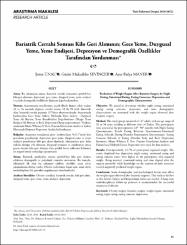| dc.contributor.author | Ünal, Şeniz | |
| dc.contributor.author | Sevinçer, Güzin Mukaddes | |
| dc.contributor.author | Maner, Ayşe Fulya | |
| dc.date.accessioned | 2019-12-01T11:20:29Z | |
| dc.date.available | 2019-12-01T11:20:29Z | |
| dc.date.issued | 2019 | en_US |
| dc.identifier.issn | 1300-2163 | |
| dc.identifier.uri | https://hdl.handle.net/11363/1505 | |
| dc.description.abstract | Amaç: Bu çalışmanın amacı, bariatrik cerrahi sonrasında görülebilen kilo geri alımının; depresyon, gece yeme, duygusal yeme, yeme endişesi ve çeşitli demografik özelliklerle ilişkisini değerlendirmektir.
Yöntem: Araştırmanın örneklemini; çeşitli illerde ikamet eden, yaşları 21 ve 56 arasında değişen, cerrahi sonrası 12 ila 98 aylık dönemde olan, bariatrik cerrahi geçirmiş 117 birey oluşturmaktadır. Araştırmada katılımcılara Gece Yeme Anketi, Hollanda Yeme Anketi - Duygusal Yeme Alt Boyutu, Yeme Bozuklukları Değerlendirme Ölçeği- Yeme Endişesi Alt Boyutu ve Beck Depresyon Ölçeği uygulanmıştır. Verilerin analizinde Mann Whitney U Testi, Pearson Korelasyon Analizi ve Çoklu Hiyerarşik Doğrusal Regresyon Analizi kullanılmıştır.
Bulgular: Araştırma sonuçlarına göre; katılımcıların %13,7’sinde kilo geri alımı gerçekleştiği; depresyon, gece yeme, duygusal yeme ve yeme endişesi puanlarının kilo geri alımı olanlarda, olmayanlara göre daha yüksek olduğu; evli olmanın, duygusal yemenin ve ameliyattan sonra geçen sürenin kilo geri; ihtiyacı olan günlük besin miktarını bilmenin ise negatif yönde yordadığı saptanmıştır.
Sonuç: Bariatrik ameliyatlar sonrası görülebilen kilo geri alımını etkileyen demografik ve psikolojik etmenler mevcuttur. Bu konuda, ülkemizde ilk olan bu çalışmayı takiben, özellikle uzun izlem çalışmalarına ihtiyaç vardır. Obezite tedavisinde başarı için, uzun süreli multidisipliner bir protokol uygulanması önerilmektedir. | en_US |
| dc.description.abstract | Objective: We aimed to determine whether night eating, emotional eating, eating concerns, depression, and some demographic characteristics are associated with the weight regain observed after bariatric surgery.
Method: The study group consisted of 117 adults with an age range of 21 to 56 years, residing at different cities of Turkey. The participants were assessed at the post-operative 12th- 98th months with Night Eating Questionnaire, Dutch Eating Behavior Questionnaire-Emotional Eating Subscale, Eating Disorder Examination Questionnaire, Eating Concern Subscale of Eating Disorder Scale and Beck Depression Inventory. Mann Whitney U Test, Pearson Correlation Analysis and Hierarchical Multiple Linear Regression were used for data analyses.
Results: Post-operatively, 13.7% of participants regained weight. The results displayed that depression, night eating, emotional eating and eating concern scores were higher in the participants who regained weight. Being married, emotional eating and time elapsed after the surgery positively, while knowledge on the amount of daily nutrients needed negatively predicted weight regain.
Conclusion: Some demographic and psychological factors may affect the weight regain observed after bariatric surgeries. This study is the first in this field in Turkey, and longitudinal studies are needed. A long term multidisciplinary follow-up protocol is recommended for successful treatment of obesity. | en_US |
| dc.language.iso | tur | en_US |
| dc.publisher | TURKIYE SINIR VE RUH SAGLIGI DERNEGI, PK 401, YENISEHIR, 06442, TURKEY | en_US |
| dc.relation.isversionof | 10.5080/u23174 | en_US |
| dc.rights | info:eu-repo/semantics/openAccess | en_US |
| dc.rights | Attribution-NonCommercial-NoDerivs 3.0 United States | * |
| dc.rights.uri | http://creativecommons.org/licenses/by-nc-nd/3.0/us/ | * |
| dc.subject | Obezite cerrahisi | en_US |
| dc.subject | bariatrik cerrahi | en_US |
| dc.subject | kilo geri alımı | en_US |
| dc.subject | duygusal yeme | en_US |
| dc.subject | gece yeme | en_US |
| dc.subject | yeme endişesi | en_US |
| dc.subject | depresyon | en_US |
| dc.subject | Obesity surgery | en_US |
| dc.subject | bariatric surgery | en_US |
| dc.subject | weight regain | en_US |
| dc.subject | night eating | en_US |
| dc.subject | eating concern | en_US |
| dc.subject | BODY-MASS INDEX | en_US |
| dc.subject | depression | en_US |
| dc.subject | GASTRIC BYPASS | en_US |
| dc.subject | SURGICAL-TREATMENT | en_US |
| dc.subject | TURKISH VERSION | en_US |
| dc.subject | MARITAL-STATUS | en_US |
| dc.subject | OBESITY | en_US |
| dc.subject | MAINTENANCE | en_US |
| dc.subject | BEHAVIOR | en_US |
| dc.subject | OUTCOMES | en_US |
| dc.subject | IMPACT | en_US |
| dc.subject | INTERDISCIPLINARY RESEARCH AREAS | en_US |
| dc.title | Bariatrik Cerrahi Sonrası Kilo Geri Alımının; Gece Yeme, Duygusal Yeme, Yeme Endişesi, Depresyon ve Demografik Özellikler Tarafından Yordanması | en_US |
| dc.title.alternative | Prediction of Weight Regain After Bariatric Surgery by Night Eating, Emotional Eating, Eating Concerns, Depression and Demographic Characteristics | en_US |
| dc.type | article | en_US |
| dc.relation.ispartof | Türk Psikiyatri Dergisi | en_US |
| dc.department | İktisadi İdari ve Sosyal Bilimler Fakültesi | en_US |
| dc.authorid | https://orcid.org/0000-0003-2198-3002 | en_US |
| dc.authorid | https://orcid.org/0000-0002-8244-8647 | en_US |
| dc.authorid | https://orcid.org/0000-0003-1429-9333 | en_US |
| dc.identifier.volume | 30 | en_US |
| dc.identifier.issue | 1 | en_US |
| dc.identifier.startpage | 31 | en_US |
| dc.identifier.endpage | 41 | en_US |
| dc.relation.publicationcategory | Makale - Uluslararası Hakemli Dergi - Kurum Öğretim Elemanı | en_US |



















